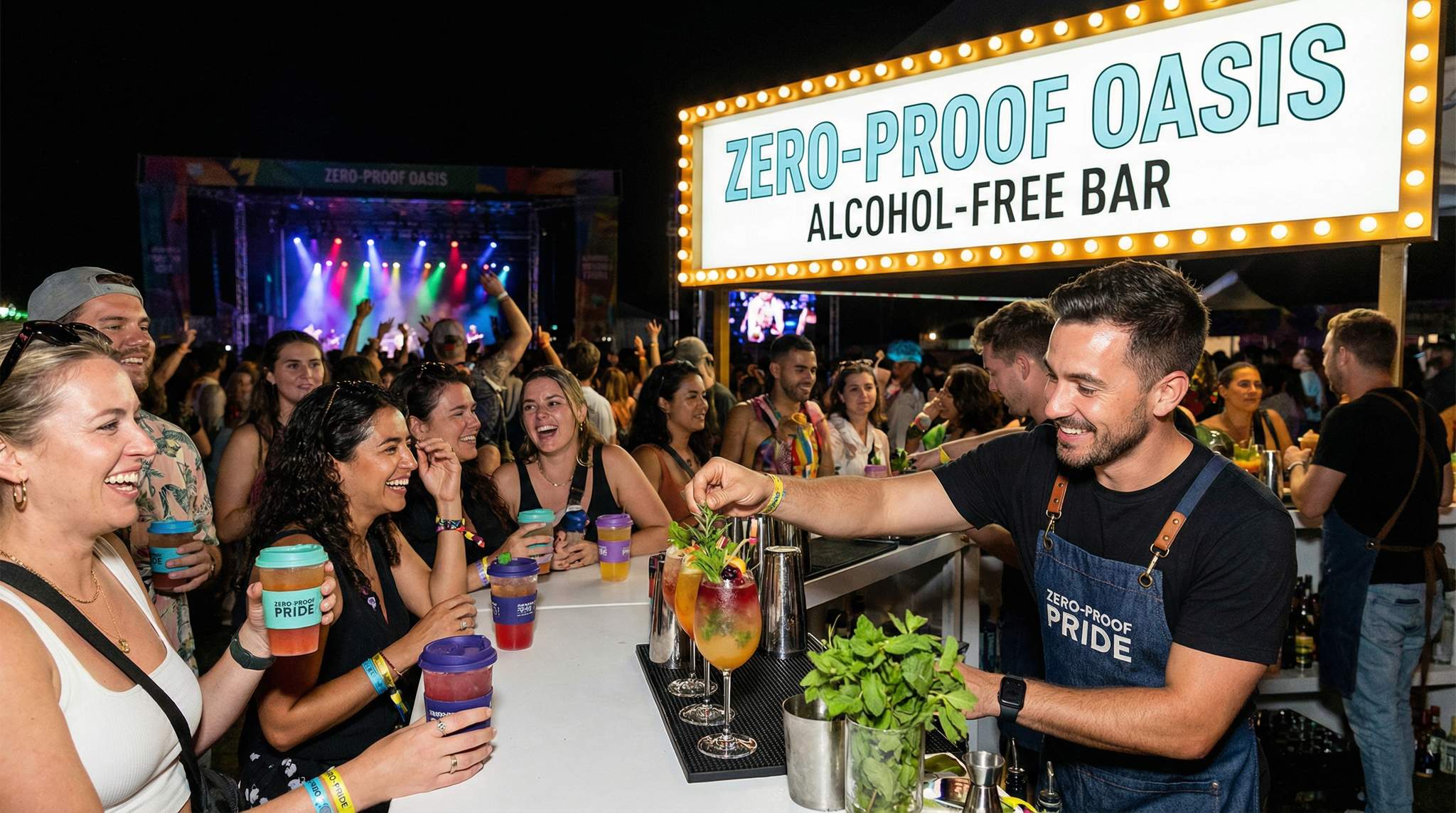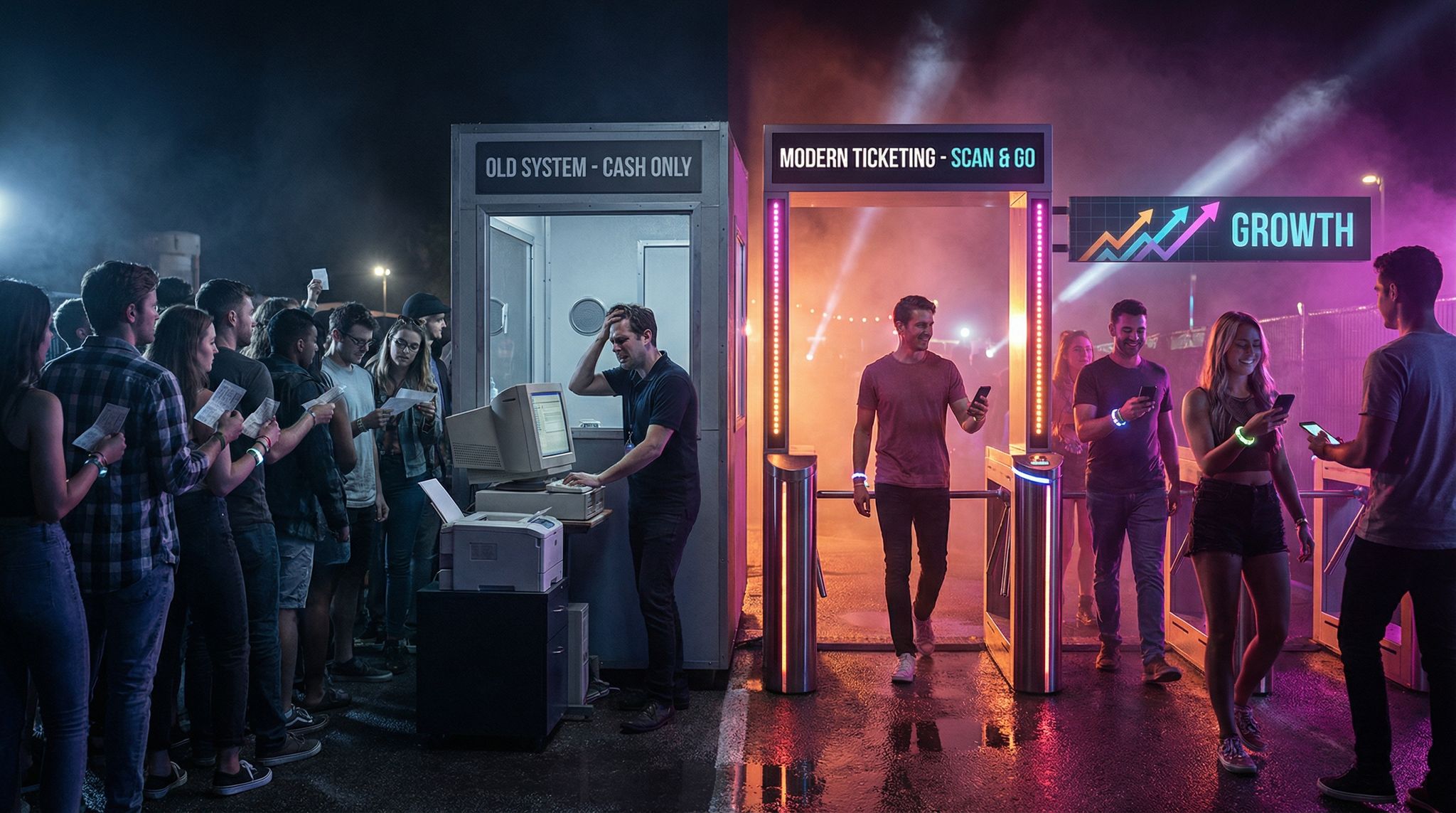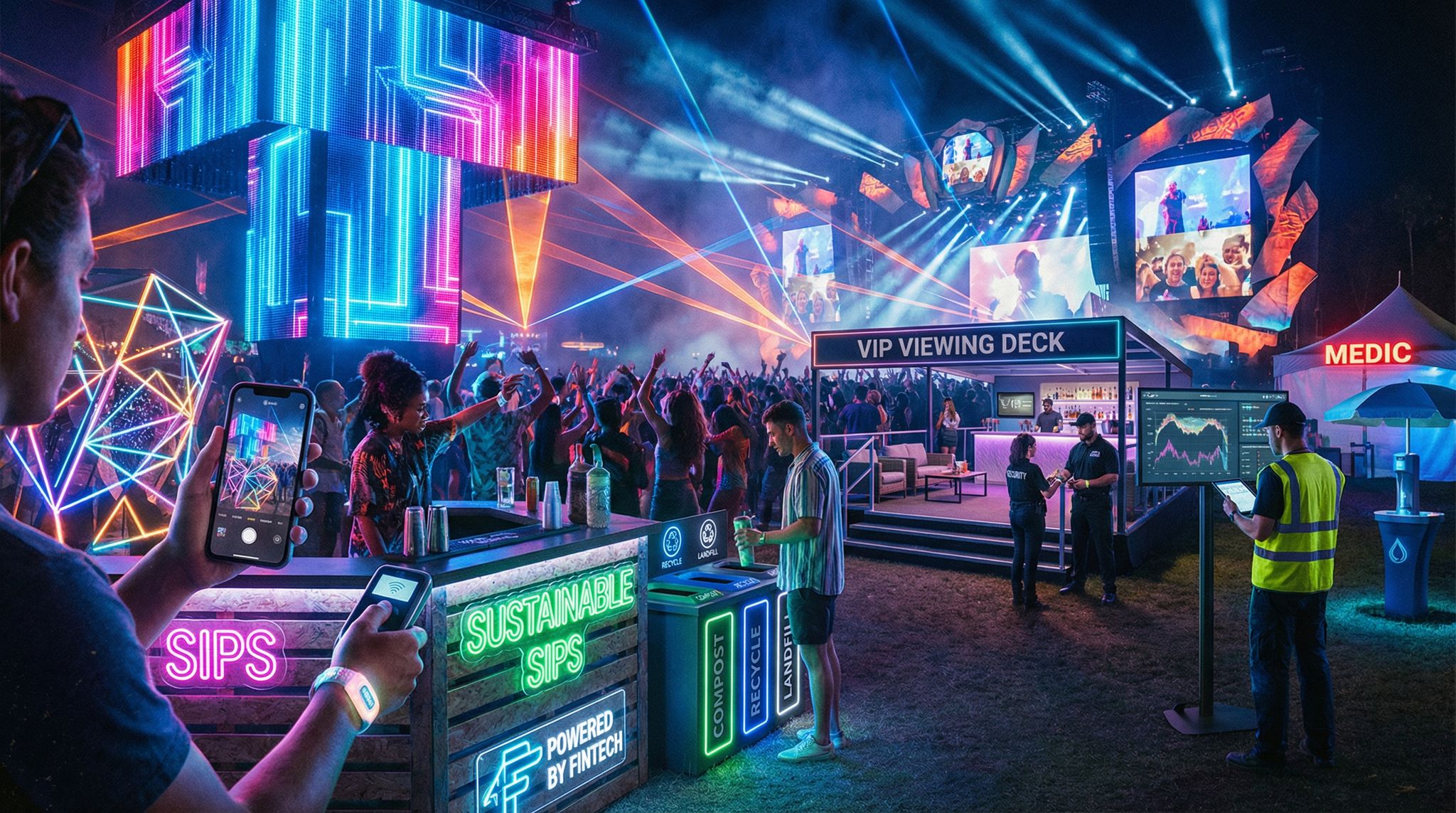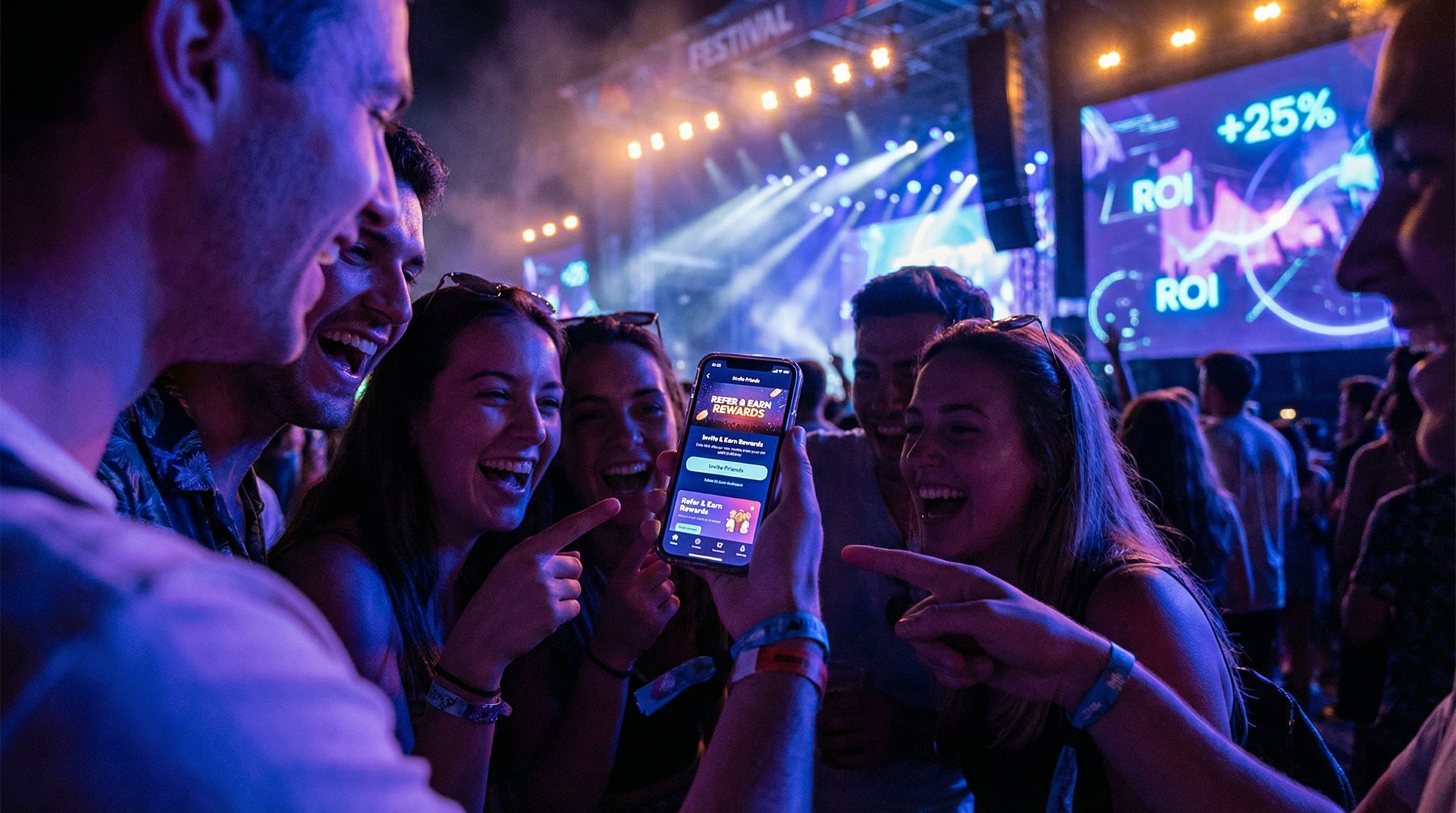The era of treating non-alcoholic drinks as an afterthought at festivals is over. Today’s festival producers are embracing zero-proof beverage strategies with pride, recognising that choice and inclusivity are keys to great hospitality. A music festival without alcohol might have once seemed unimaginable, but now many event organisers find that plenty of attendees welcome top-notch alcohol-free refreshments, as highlighted in reports on alcohol-free music festivals. With younger audiences drinking less overall and “sober curious” lifestyles on the rise, the demand for satisfying zero-proof options has surged, as Gen Z is drinking less alcohol. In fact, the landscape of festival beverages is evolving towards mindful drinking and non-alcoholic options – Carnival Oasis 2024 even put sophisticated mocktails centre stage in its lineup, showing how festivals embrace mindful drinking trends.
Why Zero-Proof Matters at Festivals
Offering alcohol-free beverages isn’t just a nod to teetotalers – it’s a savvy business and community decision. Festivals around the world have begun showcasing creative zero-proof drinks to make everyone feel included. For example, Parklife, one of the UK’s premier music festivals, introduced an immersive alcohol-free bar experience (in partnership with a group called Love From) to serve craft mocktails on site, an initiative bringing sober summer vibes to festivals. This move fed into a “booze-free revolution” gaining momentum worldwide and earned Parklife praise for its inclusivity. Other events have gone even further: Manifestival in Ireland is a four-day music festival completely free of alcohol, built around wellness activities and flavourful alcohol-free drinks. By catering to attendees who don’t drink – whether for health, faith, age (under-21 patrons), or just preference – festivals can broaden their audience and demonstrate genuine hospitality. Crucially, an inclusive beverage programme ensures that no guest is left holding only a bottle of water while friends indulge; everyone gets to enjoy something special in hand.
Beyond inclusivity, there are practical upsides to a zero-proof strategy. Attendees who moderate or avoid alcohol tend to stay alert and engaged longer – meaning they enjoy more of the event (and often spend more on food, merch, or activities). Fewer overly intoxicated people in the crowd can also lead to a safer festival environment and less strain on medical/security teams. For instance, at Electric Picnic in Ireland, a partnership with Heineken 0.0 rewarded designated drivers with a “Drive Thr0.0” experience and handed out over 12,500 free alcohol-free beers—part of a successful Heineken 0.0 activation campaign—an initiative that was wildly popular and showed the huge appetite for quality zero-proof options. In short, empowering sober or sober-curious attendees with great choices isn’t just altruistic; it’s a win-win that can boost a festival’s reputation, revenue, and safety record.
Crafting an Attractive Non-Alcoholic Menu with Real Craft
The first step in “zero-proof with pride” is to build a non-alcoholic drink menu so enticing that it rivals the cocktail list. It’s not enough to stock cola and call it a day – today’s festival-goers expect real craft in their alcohol-free options. That means borrowing techniques from craft cocktail bars and speciality coffee shops to deliver complexity and flair in every zero-proof drink.
Think like a mixologist: Design signature alcohol-free cocktails (often called mocktails or spirit-free cocktails) with as much creativity as any alcoholic beverage. Use fresh, high-quality ingredients – from exotic fruit purées and cold-pressed juices to herbs, spices, and artisanal syrups – to create layered flavours. For example, at Carnival Oasis 2024, expert mixologists crafted mocktails with exotic fruit blends and herb infusions, making each drink a sensory delight that appealed even to dedicated cocktail enthusiasts. Consider offering a range of profiles: something refreshing and tangy (citrus, ginger, etc.), something rich and creamy (coconut, oat milk, etc.), something spicy or herbal (chili, basil, rosemary), and something light and bubbly (sparkling water or tea-based spritzes). Variety ensures there’s a zero-proof drink for every taste.
Showcase quality and presentation: Presentation matters – serve these drinks in proper glassware (or quality compostable cups at outdoor events) with eye-catching garnishes. A zero-proof hibiscus ginger fizz in a tall glass with mint and a slice of candied ginger will draw as many Instagram snaps as any neon-coloured cocktail. By making the non-alcoholic menu visually and gastronomically appealing, you signal to guests that these options are a core part of the festival experience, not an afterthought. Some boutique festivals even collaborate with local craft beverage makers – like artisanal soda brewers, kombucha brewers, or coffee roasters – to co-create unique drinks exclusive to the event. This not only adds authenticity and local flair but can also open up sponsorship opportunities (for instance, a kombucha brand sponsoring your “Zero-Proof Zen” bar).
Planning a Festival?
Ticket Fairy's festival ticketing platform handles multi-day passes, RFID wristbands, and complex festival operations.
Don’t forget beers and wines: The craft isn’t limited to cocktails. The market for non-alcoholic beers and wines has exploded in recent years, and many are good enough to please a craft beer lover or wine aficionado. Stock a popular NA beer (such as Heineken 0.0 or well-reviewed craft NA brews) and perhaps a dealcoholized sparkling wine or rosé. These give “near beer” or wine alternatives for those who want the semblance of a drink in hand during a show without the alcohol. Tasting notes can even be displayed, treating them with the same respect as their alcoholic counterparts. As many festival-goers will attest, non-alcoholic drinks have come a long way in quality – you can now get the taste of a nice cold lager or cocktail without the alcohol kick, so leverage those advancements.
Finally, when pricing these offerings, be mindful and fair. Attendees shouldn’t feel penalised for choosing a drink without alcohol. While it’s reasonable that a crafted virgin cocktail might cost nearly as much as a regular cocktail (due to fresh ingredients and labour), try to keep some affordable alcohol-free options on the menu as well. This could be as simple as flavourful infused waters or fancy lemonades at a lower price point alongside the more complex mocktails. The goal is to encourage uptake, so remove any barriers that might make guests hesitate to try the zero-proof choices.
Strategic Placement: Bring Zero-Proof to the Party
Where and how you serve your non-alcoholic offerings can hugely influence their success. The motto here is accessibility and prominence. If zero-proof drinks are hidden away at a lone “sober tent” far from the main stage, many curious attendees will never find them. Instead, integrate your alcohol-free bars or stalls into prime locations of the festival.
One effective strategy is to place a dedicated zero-proof bar near high-energy areas like dance floors or live music stages. Festival-goers working up a sweat dancing will appreciate a quick, tasty refreshment that doesn’t dehydrate them further – so a bar serving icy mocktails or rejuvenating drinks right by the action can be a hit. For instance, if you have an indoor listening room or chill-out stage, consider a zero-proof cocktail lounge adjacent to it, where people can sip and savour while enjoying the performance. Placing alcohol-free options next to the “party” isn’t counterintuitive; it normalises sober enjoyment in the heart of the event. Attendees grabbing a drink there just become part of the same festive bustle, rather than making a separate trek to find a non-alcohol option.
Also ensure that every main bar or beverage point on site carries at least a few non-alcoholic choices. Many large festivals have started to include NA beer and canned mocktails right on the menu boards beside beers and spirits, so that the default assumption is “something for everyone.” At a smaller boutique festival, you might have just two bars total; in that case, train both to make the full slate of alcoholic and non-alcoholic specialties so no matter where people order, they have choices.
If budget and space allow, consider creating a lively zero-proof specialty bar as a focal point. Decorate it appealingly (bright colours, “Zero-Proof with Pride” signage, comfy seating) to draw interest from all attendees, not just non-drinkers. Some festivals even incorporate wellness elements here – e.g. a “Hydration Station” that offers coconut water, electrolyte drinks, and craft mocktails in a relaxing lounge setting. The key is visibility. The closer and more visible your zero-proof offerings are to the main attractions (without forcing those not interested to engage, of course), the more uptake you’ll get. You are effectively saying: “we’ve got amazing drinks here for you, right where you need them, whether or not they contain alcohol.”
Need Festival Funding?
Get the capital you need to book headliners, secure venues, and scale your festival production.
Train Your Staff to Pitch Without Stigma
Even the best zero-proof menu can fall flat if festival staff don’t treat it with the enthusiasm and respect it deserves. A common pitfall is stigma: the subtle (or not-so-subtle) perception that a non-alcoholic drink is a “lesser” choice. To overcome this, invest in training your bar staff and volunteers to promote zero-proof options proudly and without judgement.
Start by educating staff on why these options matter. Make sure they understand that many people (including possibly themselves or their friends) may choose not to drink for a variety of good reasons – and those guests are excited to see real options available. Emphasise that suggesting a creative alcohol-free cocktail to someone can be just as satisfying as selling a beer, because you’re improving that guest’s experience. If staff take pride in the festival’s inclusive ethos, it will show in their interactions.
Next, train on the specifics of the zero-proof menu. Your bartenders should know the ingredients and flavour profiles of the mocktails and speciality drinks so they can describe them enticingly (“The Sunshine Spritz is a tangy mix of yuzu, elderflower, and mint – super refreshing!”). Let staff sample the non-alcoholic drinks during training, just as they might taste-test the craft beers or cocktail specials, so they personally appreciate how good they are. This way, if an undecided patron hovers at the bar, the staff can confidently say “You’ve got to try our house zero-proof cooler, it’s honestly one of my favourites this year,” and not have it sound like a half-hearted upsell.
Language is a big part of destigmatising. Encourage staff to avoid terms like “mocktail” or “virgin drink” when pitching to customers if those might carry a negative connotation; often just using the drink’s name or saying “spirit-free” in a positive tone is better. Certainly, no bartender should ever say something dismissive like “oh it’s just a non-alcoholic one” – instead, they can highlight what’s in the drink (“this one’s alcohol-free, with a homemade ginger syrup and local berries, really delicious”). The idea is to focus on the craft and flavour, not the absence of alcohol.
Also, instruct staff to offer zero-proof options proactively in certain scenarios. If someone asks for water or seems hesitant about drinking, it’s a perfect opening to offer a non-alcoholic specialty: “We have free water at the refill station, but can I interest you in a cold-brew iced tea or a cucumber-mint spritzer? They’ve been popular today.” By doing this, you remove any sense of awkwardness the guest might feel about asking for a non-alcoholic option – your team already put it on the table with a smile. It tells the attendee that choosing a zero-proof beverage at your festival is not only normal, but encouraged.
Finally, lead by example at the management level. If you as the festival organiser are hosting VIP guests or doing on-camera toasts, occasionally raise a glass of the alcohol-free signature drink. These gestures filter down and set a tone. The more your whole festival crew treats the zero-proof offerings as equally celebrated, the more your attendees will follow suit.
Monitor, Measure, and Iterate
How will you know if your zero-proof strategy is working? Like any aspect of festival production, you’ll want to track uptake and gather feedback – then iterate to improve year on year. Start by collecting some basic data: sales numbers for non-alcoholic drinks vs. alcoholic ones each day, which specific drinks are most and least popular, and at what times of day sales peak. If you use a modern point-of-sale system, you can tag and tally these easily. Over the course of the event (and certainly post-event), review the numbers. Did that signature hibiscus mocktail sell out by 9 pm each night? Did the kombucha vendor in the wellness area see steady traffic or lulls? Such insights help in tweaking inventory and placement (maybe next time you stock more of a popular flavour, or move a slow-selling item to a different spot or replace it altogether).
Beyond the numbers, seek qualitative feedback. Train your social media or community engagement team to watch for attendee feedback about the drinks. Are people posting praise about the tasty mocktails? Or complaining that they couldn’t find the zero-proof bar easily? You might even include a question about beverage satisfaction in your post-festival attendee survey. Some festivals have had success with interactive approaches like allowing attendees to vote for their favorite festival mocktail via the event app or QR codes on menus – which not only provides data, but creates a fun engagement.
Use all this input to iterate your recipes and approach. Perhaps you discover that your audience really loved botanical, not-too-sweet drinks but didn’t care for the super sugary soda float – that’s a cue to adjust the balance next time. Or maybe an alcohol-free beer outsold some regular beers; that could justify expanding those offerings. Innovation in the zero-proof sector is rapid, so keep an eye on trends and new products year-round. What’s popular at other events? (For instance, cold brew coffee cocktails or fermented tea drinks might be hits at a wellness-oriented festival, whereas a pop-culture comic-con event might find success with themed “mocktails” named after characters.) Don’t be afraid to refresh your menu each festival edition and keep experimenting.
There’s also benefit in sharing notes within the festival industry. The next wave of festival producers can collectively push zero-proof craft forward by exchanging what worked and what didn’t. Many festivals have already learned that thoughtful alcohol-free options are appreciated – now it’s about refining them to be even more enticing. By tracking and iterating, you ensure that your beverage programme stays dynamic and continues to impress veteran attendees and newcomers alike.
Choice as the Ultimate Hospitality
At the end of the day, offering a robust zero-proof selection is about embracing a simple but powerful idea: choice is hospitality. The core job of any festival organiser is to make every guest feel welcome and taken care of. In the realm of beverages, that means providing choices to suit all preferences and situations.
When you proudly serve a delicious non-alcoholic cocktail alongside the beers and wines, you’re saying to your attendees, “we see you, and we’ve thought of you.” Consider the impact on a festival-goer who doesn’t drink alcohol – instead of feeling left out or having to bring their own beverages, they get to enjoy a creative drink crafted just for them. That sense of inclusion builds loyalty and positive buzz. Even those who do drink alcohol will appreciate having the option when they simply want to pace themselves or stay clear-headed for a while. You’re empowering your crowd to celebrate on their own terms, which ultimately leads to a more positive collective experience.
There are real success stories underscoring this philosophy. Major festivals like Bonnaroo in the U.S. have even implemented support networks for sober attendees – for example, Bonnaroo’s “Soberoo” meet-ups and Insomniac’s Consciousness Group at EDM festivals, which help promote sober raving environments to provide a welcoming community. These initiatives go hand-in-hand with offering great alcohol-free refreshments: it’s all part of an environment where no one feels that their enjoyment is second-class. Festival producers often recount how introducing zero-proof options brought unexpected goodwill – for instance, the designated drivers who got a free craft NA beer and a thank-you felt more valued, and the group of friends with one sober member ended up all trying the interesting mocktails together. Such moments enhance the festival spirit rather than detract from it.
In embracing zero-proof with pride, you’re aligning with a broader cultural shift and positioning your event as forward-thinking and caring. It’s not about banning alcohol; it’s about elevating hospitality by widening the choices available. After all, the best festivals are those where every attendee – drinker or not – feels they belong and can fully enjoy the celebration. When you see a crowd raising glasses of both champagne and alcohol-free sparkling tea during a headline act toast, you’ll know your inclusive beverage strategy has truly succeeded.
Frequently Asked Questions
Why are music festivals adopting zero-proof beverage strategies?
Festivals adopt zero-proof strategies to improve inclusivity and cater to younger demographics, such as Gen Z, who are drinking less alcohol. Offering high-quality non-alcoholic options keeps attendees alert and engaged longer, increases spending on food and merchandise, and improves safety by reducing intoxication levels and strain on security teams.
How can festivals create an attractive non-alcoholic drink menu?
Create attractive non-alcoholic menus by applying craft mixology techniques using fresh ingredients like exotic fruit purées, cold-pressed juices, herbs, and artisanal syrups. Offer a diverse range of flavor profiles—such as spicy, creamy, or refreshing—and serve drinks in proper glassware with eye-catching garnishes to rival the visual appeal of traditional cocktails.
Where is the best place to locate zero-proof bars at festivals?
Zero-proof bars perform best when integrated into high-energy areas near dance floors and live music stages rather than being isolated in remote locations. Placing alcohol-free options prominently alongside main bars ensures accessibility and normalizes sober enjoyment, allowing attendees to remain part of the festive atmosphere while grabbing a drink.
What are the benefits of offering alcohol-free options at festivals?
Offering alcohol-free options enhances inclusivity for non-drinkers, designated drivers, and sober-curious attendees, ensuring no guest feels left out. Practical business benefits include a safer festival environment with fewer medical incidents and increased revenue, as alert attendees tend to stay longer and spend more on other festival offerings.
How should festival staff promote non-alcoholic beverages?
Staff should promote non-alcoholic beverages with enthusiasm and without stigma, avoiding dismissive terms like “virgin” in favor of positive descriptors like “spirit-free.” Effective promotion involves training bartenders on flavor profiles so they can describe drinks enticingly and proactively offering these sophisticated options to guests who might otherwise just order water.
Which music festivals have successful alcohol-free initiatives?
Several global festivals have successfully implemented zero-proof initiatives. Parklife in the UK introduced an immersive alcohol-free bar serving craft mocktails, while Ireland’s Manifestival is a completely alcohol-free music event. Additionally, Electric Picnic partnered with Heineken 0.0 to reward designated drivers, and Carnival Oasis featured sophisticated mocktails centrally in its lineup.
How should festivals price non-alcoholic craft cocktails?
Festivals should price non-alcoholic craft cocktails fairly to reflect the cost of fresh ingredients, quality glassware, and skilled labor. While complex mocktails may command prices similar to alcoholic drinks, organizers should also provide affordable alternatives, such as fancy lemonades or infused waters, to ensure cost is not a barrier to entry.
How can festivals measure the success of zero-proof beverage programs?
Organizers measure success by tracking sales data to identify popular drinks and peak purchasing times via point-of-sale systems. Beyond quantitative metrics, festivals gather qualitative feedback through social media monitoring, app-based voting, and post-event surveys to understand attendee satisfaction and refine recipes or inventory for future events.





